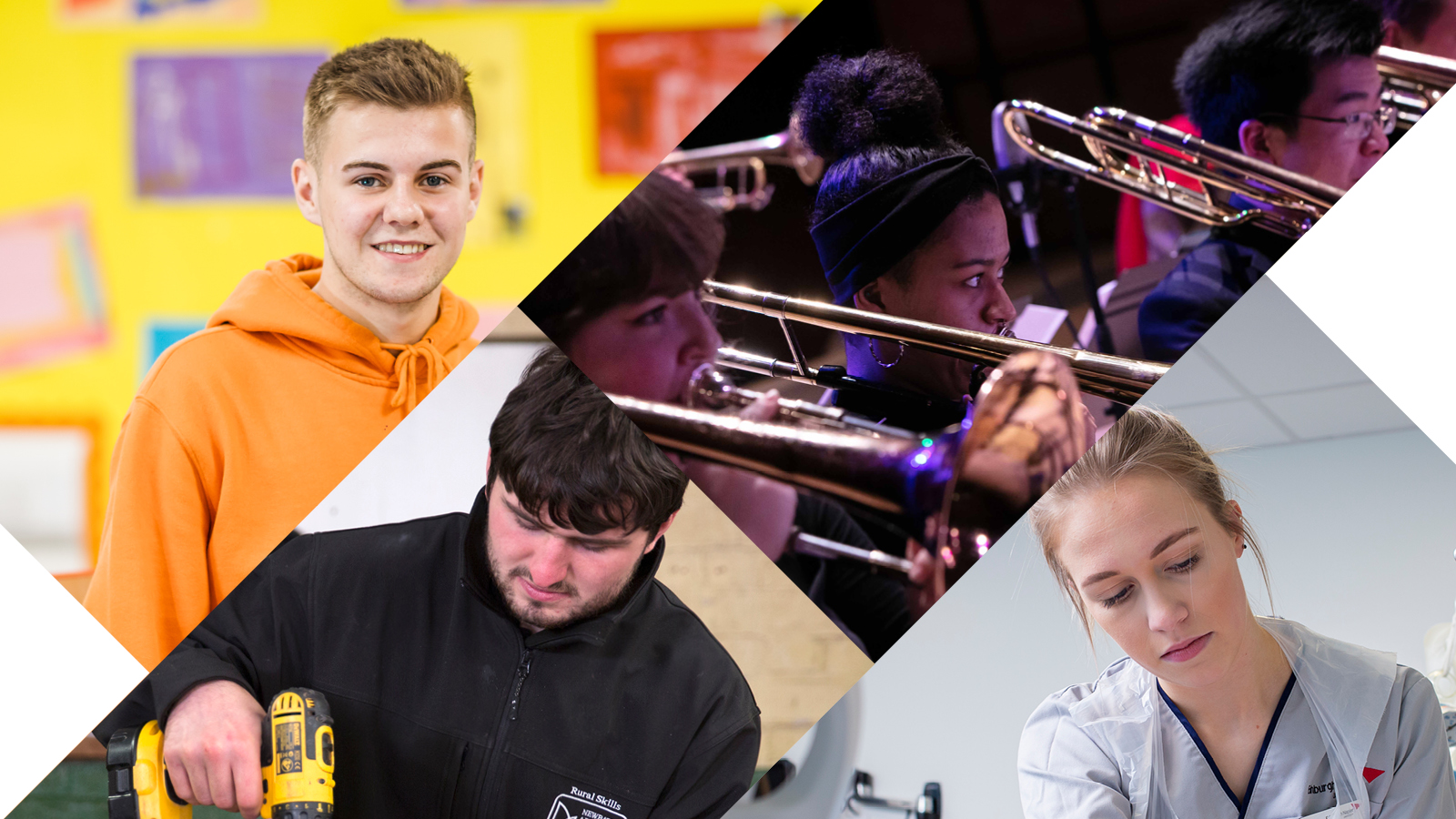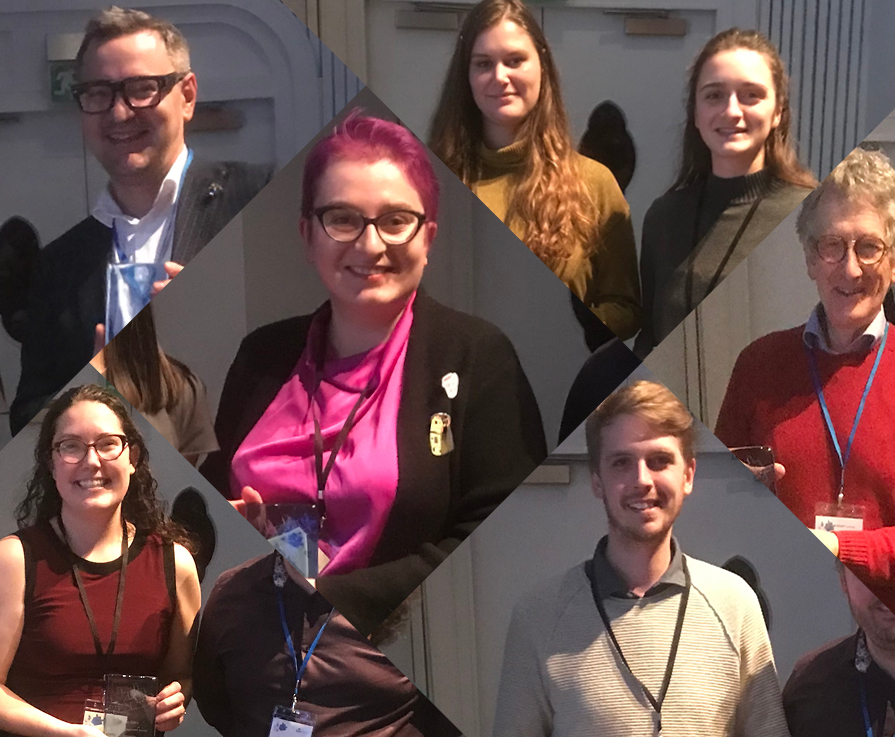
How we operate – Equality and diversity
Widening access – equality and diversity

The Scottish Funding Council (SFC) and the Equality and Human Rights Commission (EHRC) have come together to identify the most persistent inequalities in Scotland’s colleges and universities and to pave the way for their removal.
The joint report, published today, is the first time national equality outcomes have been agreed in partnership between a sector body and Britain’s equality regulator.
Equality outcomes are results that public bodies should aim to achieve to address inequality and discrimination and improve people’s life chances. The outcomes set out in the report target improvements to the retention, representation and success of students and staff with a range of protected characteristics, as well as the procedures, services and support that colleges and universities should offer them to address any discrimination and disadvantage.
The Scottish Funding Council and the EHRC will support Scotland’s colleges and universities to meet their responsibilities under the Public Sector Equality Duty, which provides the legal framework to make these changes happen.
In developing national equality outcomes for tertiary education, the partners involved equality experts from colleges and universities and sought advice from charities and people with real-life experiences of the effects of inequality.
Both SFC and the EHRC are keen to recognise the work already being done by colleges and universities, as well as some student associations. Today’s report will develop and support a collective response to eliminating inequalities in the sector, while helping foster good relations and identify chances to advance equality of opportunity.
Karen Watt, Chief Executive of the Scottish Funding Council, said:
“Equality, diversity and inclusion are central to SFC’s mission and values. We know that participation and success rates for students studying at college or university differ for students who share different protected characteristics.
“We will work with the sector and the EHRC to address persistent inequalities. The joint report we are publishing today incorporates the views of experts in tertiary education and beyond and sets out the hardest barriers to equality we are seeking to overcome, and what students should expect in terms of fairer opportunities and outcomes for the future.”
Marcial Boo, Chief Executive of the Equality and Human Rights Commission, said:
“Too many people still face discrimination and barriers to opportunity in higher and further education settings, whether they are students or staff.
“By acting together to address the most persistent inequalities in Scotland’s colleges and universities, we can make a lasting positive difference to people’s lives and help build a fairer country.
“This is the first time that a set of national equality outcomes have been agreed anywhere in Britain. As Britain’s authoritative equality regulator, we encourage public bodies in other sectors to look at and mirror this approach to strengthen their own compliance with the Public Sector Equality Duty.”
Khadija Mohammed, Senior Lecturer in Education at The University of The West of Scotland and Senior Fellow of the Higher Education Academy, said:
“I welcome this report from SFC and the EHRC. In Scotland, we asked our vice-chancellors, university leaders and governing bodies to demonstrate leadership and accountability for eliminating racism, consider how race is enacted in their institutions and focus on addressing it as a strategic priority.
“The development of national equality outcomes will seek to reinforce this landmark commitment to removing racism. In combination with outcomes targeting the inequalities experienced across a range of protected characteristics, it is testament to the shared agency and leadership we hoped to achieve across the sector.”
The next phase of the joint work will include agreeing a national measurement framework to help institutions report on progress. Over the next three years SFC will oversee delivery of the equality outcomes across Scotland, supporting their implementation and monitoring progress.
Tackling Persistent Inequalities Together [PDF], a joint report from the Scottish Funding Council and the Equality and Human Rights Commission, is available from today.

Photo: Edinburgh Napier University
Graduate Apprenticeships – what an opportunity!
Employers are increasingly taking on Graduate Apprentices to secure new talent and ensure they get the skills they need while creating opportunities for young people.
In the last year, the number of employers offering Graduate Apprenticeships rose to 530 – supporting 1,166 learners nationwide. The latest annual progress report for Graduate Apprenticeships, published by Skills Development Scotland and the Scottish Funding Council, also reveals rising numbers of under-25s enrolling as Graduate Apprentices.
This age group accounted for almost half of all starts in 2021-22, supporting the ambitions of the Scottish Government Young Person’s Guarantee and meeting the needs of learners. Employers supporting Graduate Apprentices can develop their workforce and fill critical skills gaps, while individuals get a job, get paid and get qualified.
In the five years since their introduction in 2017, 4,692 individuals have started a Graduate Apprenticeship job. The most recent figures show more than 60 per cent of all enrolments were in a framework related to Science, Technology, Engineering or Maths (STEM).
Graduate Apprenticeships are funded by the Scottish Funding Council (SFC) and developed and supported by Skills Development Scotland (SDS), in partnership with employers and the higher education sectors.
They are offered in key occupational growth areas and support individuals in developing the technical and person skills they need to progress.
Morgan Sindall Construction is currently recruiting Graduate Apprentices.
David Lannigan, Senior Operations Manager at the firm, said apprentices are helping address critical skills shortages across the industry.
David said:
“There is a resource problem in getting people into the industry. But apprentices bring energy to the business, and Graduate Apprenticeships give us the opportunity to mould people, using a structured learning pathway.
“We are committed to using the Graduate Apprenticeship route going forward. Like most other sectors, the demographics of the industry show a high percentage of the current management resource to be in the latter stages of their careers. We must continue to not only replace this resource but also supplement it, to start to address the skills shortages we already have or the industry will face greater challenges than it presently has.”
The Scottish Government has underlined its commitment to work-based learning and the pivotal role of apprenticeships in providing jobs through the Young Person’s Guarantee, which ensures education, training, employment or an apprenticeship for all 16 to 24-year-olds.
The report highlights the important role of Graduate Apprenticeships in supporting this and upskilling and reskilling workers across all age groups.
Jamie Hepburn, Minister for Higher Education and Further Education, Youth Employment and Training said:
“Graduate Apprenticeships are a key way for all employers to continue to invest in their workforce by providing the skills they need to thrive in the face of economic challenges both now and in the future.
“They also play a central role in our immediate priority to lead Scotland into a recovery that protects and creates jobs, while supporting the future of our young people.
“The Scottish Government will continue to work collaboratively with Skills Development Scotland, the Scottish Funding Council and other key partners to ensure that we build on this progress.”
Mike Cantlay, SFC Chair, said:
“Today’s report shows that the investment we make in Graduate Apprenticeships creates real value for both individuals and businesses.
“As the economy recovers from the COVID-19 pandemic, it’s encouraging to see more employers creating more career opportunities through Graduate Apprenticeships.
“Looking to the future, Graduate Apprenticeships are well placed to support the green skills revolution needed for Scotland’s future net zero economy.”
Frank Mitchell, SDS Chair, said:
“The evidence shows that there is ever-increasing demand from employers and learners for Graduate Apprenticeships.
“Graduate Apprenticeships are real jobs with employers that not only secure well-paid jobs, but also contribute by paying tax on their earnings and don’t incur student debt. At a time when Governments need to make difficult choices, this is clearly one that should be expanded.”
The new annual progress report for Graduate Apprenticeships [PDF], published by Skills Development Scotland and the Scottish Funding Council is now available.
Research funding

The Scottish Funding Council (SFC) is delighted to announce the injection of an additional £24.6m of funding to Scotland’s universities to protect the nation’s research base and to provide stability ahead of a final decision on the UK’s association to Horizon Europe, the EU’s key funding programme for research and innovation. This announcement comes in the wake of a UK package of support announced by the Department of Business, Energy and Industrial Strategy (BEIS) last month.
Scotland has an outstanding reputation for world-leading research as confirmed by the recent UK-wide assessment of university research, with almost 90% of Scottish university research being judged to have outstanding or very considerable impact. This global reputation is enhanced by the collaborative nature of Scotland’s research base, with Scotland’s share of the total funding awarded to UK organisations from Horizon Europe’s predecessor programme, Horizon 2020, reaching 11.3%.
Given the ongoing delay to a decision on the UK’s association to Horizon Europe, this additional funding will enable universities to target priority issues including:
- Developing, supporting and amplifying international collaborations and partnerships.
- Recruiting and retaining talent, including internationally and at all career stages.
- Promoting positive research cultures, research careers and the diversity of people involved in the research process.
- Pursuing long-term research strategies, capacity building and strategic investment in research priorities.
- Seeding or piloting cross-disciplinary activities within an institution and/or between institutions.
- Supporting fundamental research and research into novel ideas that provides the foundation for later breakthroughs and impact.
- Mitigating shortfalls in research income due to uncertainty over European Union (EU) research grants.
- Providing overheads or additional investment that support funding from other sources.
Included within this additional funding is £5.2m to support capital investment in the physical infrastructure for research, enabling universities to invest in essential research equipment and sustain their excellent research base.
Commenting on this additional funding, Helen Cross, SFC Director of Research and Innovation, said:
“While association to Horizon Europe remains the sector’s ambition, we welcome this much-needed investment in Scotland’s research base which will help our universities sustain their outstanding reputation for world-leading research and their strong track record of working in collaboration with European partners.”
Minister for Higher Education, Further Education, Youth Employment and Training Jamie Hepburn said:
“This allocation reflects Scotland’s previous track record of success and influential position in the prestigious and highly competitive Horizon research programme.
“The package of support being provided is much needed but focus must not be lost on achieving a long-term solution. Maximising participation in Horizon Europe is the best outcome for Scotland. Full association with Horizon is the best option to achieve this.
“We continue to urge the UK Government to work together with the European Commission to limit the damage caused by Brexit. Finding a mutually beneficial solution for our research and innovation communities remains of pressing importance.”
Professor Dame Sally Mapstone, Principal of University of St Andrews and Convener of Universities Scotland:
“On behalf of universities in Scotland, I welcome this vital injection of additional funds to support research excellence across the nation. We are hopeful that agreement can be found to ensure our universities can continue to be a part of Horizon.”
The funding will be distributed through allocations calculated by formula.
See full details on allocation of the funds.
Statistical publication schedule

A record high proportion of college leavers have progressed to positive destinations according to the latest College Leaver Destination report from the Scottish Funding Council.
The report, which looks at students completing their qualifications in 2020-21, has found that 91% of sector leavers moved into work, training or further study between 3 and 6 months after leaving college. This is an increase of 6.6 percentage points (pp) on the previous academic year, although the 2019-20 figures were suppressed by the effects of the COVID-19 pandemic. The previous highest proportion was in 2017-18 when 89.1% of qualifiers progressed to a positive destination.
The authors of the report emphasise that college leavers in 2020-21 were entering a very different job market than that experienced by their counterparts from the year before. Leavers from 2019-20 faced the uncertainty of the second half of 2020 when the vaccination programme was yet to be rolled out. The uncertainty continued into the first half of 2021 when the country remained mainly in lockdown.
Those leaving college in 2020-21 experienced a job market that was quickly recovering from the pandemic. According to today’s figures, this resulted in a reduction in the number of leavers entering unemployment or being unable to work. At the same time, progressing to further study at university remained an attractive option for those not entering the workforce after completing their college qualifications.
The report also includes 95 qualifiers who were forced to defer their studies from 2019-20 as a result of the pandemic. Three quarters of these students with confirmed destinations continued in college and 17% went on to find a job.
Martin Boyle, Director of Policy, Insight and Analytics at the Scottish Funding Council, said:
“These latest figures reflect a return to a more normal set of choices for college leavers after the disruptions of the COVID-19 pandemic. Only 9% of college leavers were unemployed or unavailable for work compared with the 15.6% we reported last year.
“Against the positive backdrop of a recovering jobs market we also saw evidence of a continuing appetite for further study with 34% of college leavers with HE level qualifications going on to study at university.
“The report shows the value of the work done by Scotland’s colleges and the importance of the pathways that exist between colleges, universities and employers in Scotland.”
The statistics also show that sectors of the economy such as engineering and tourism have seen a strong recovery as employment destinations for college leavers.
College Leaver Destinations 2020-21 is available from today.
Universities and Higher Education institutions we fund
Colleges we fund

The contributions of Scotland’s colleges and universities to rebuilding the economy and supporting communities in their recovery from the COVID-19 pandemic are illustrated in a new report published by the Scottish Funding Council (SFC).
Featuring over 80 case studies from across every region of the country, the report highlights the fundamental impact of colleges and universities on the life of the nation. Amongst the areas covered by the case studies are mental health, equality, medical research, the climate emergency and support for business and industry.
The report demonstrates how colleges have adapted to the demands of the pandemic in terms of combatting the ongoing effects on learners. One set of case studies shows how colleges used £3.4 million of special funding from SFC to address digital poverty. They also demonstrate the continuing benefits of £5 million of capital funding provided by SFC to support digital connectivity.
The report also provides examples of the response of university research departments to COVID-19 and describes new work to combat the threat of further pandemics. One such example is the Pandemic Science Hub at the University of Edinburgh which will develop and test new treatments for lung infections.
The effect of the pandemic on student’s mental health is shown by reference to a survey carried out at New College Lanarkshire in 2021. The report praises the part that Students Associations played, and continue to play, in responding to the challenges of mental health and wellbeing. It also gives examples of measures being taken to promote positive mental health such as the Man Cave project at West Lothian College, and the Student Mental Health Agreement introduced by the University of Aberdeen.
Commenting on the report James Dunphy, SFC’s Director of Access, Learning and Outcomes, said:
“We continue to work through unprecedented and uncertain times – something that creates both challenge and opportunity.
“This report shows Scotland’s colleges and universities are able to respond quickly and decisively to events in ways that both overcome the challenges and make the most of any opportunities. The benefits of this extend far beyond college and university campuses and into the economy, public services and everyday lives.”
Delivering Economic and Social Benefit through Tertiary Education and Research – College and University Case Studies 2021-22 [PDF] is now available.
Funding bodies launch consultation on future research assessment exercise

The findings of three reports initiated as part of the Future Research Assessment Programme (FRAP) have been published today.
Together the reports caution against moving to a fully metricised system for the next UK research assessment exercise. The reports do suggest ways in which metrics, AI or machine learning might be used to support or inform low-risk areas of the exercise, from allocating outputs to enabling post-assessment analysis. The four UK higher education funding bodies, who jointly oversee the Future Research Assessment Programme (FRAP), commissioned the reports as part of their broader evidence gathering process, including sector-wide consultation to inform decisions on the future of research assessment in the UK.
The three reports are:
The Metric Tide Revisited
A review of the role of metrics in research management and assessment, led by Professor Stephen Curry, Dr Elizabeth Gadd and Professor James Wilsdon. The report plots the development of the responsible research assessment agenda since the 2015 Metric Tide report. It revisits the potential use of indicators in any future REF exercise, proposing an increased use of ‘data for good’, and considers opportunities to further support the roll-out of responsible research assessment practice across the UK HE sector.
Responsible Use of Technology in Research Assessment
In early 2022, the four UK higher education funding bodies commissioned the Statistical Cybermetrics and Research Evaluation Group at the University of Wolverhampton. They were asked to investigate possible approaches to using technologies such as artificial intelligence and machine learning to support or streamline research assessment in future exercises. Overall, the study finds that such technologies could only be employed in future exercises in relatively low-risk areas of the assessment, such as allocation of research outputs to reviewers ahead of assessment, or for analytical purposes.
REF outputs analysis: Maximising the use of REF data
This report investigates how insights generated by the REF (or by future research assessment exercises) can be maximised to better understand the health of UK research. A series of analytical ‘experiments’ explore the feasibility of more granular analysis of research assessment data to gain insight into disciplinary and interdisciplinary strengths. The report finds that future exercises could incorporate some automation in post-assessment data analysis, but that such approaches should be complemented by peer review to validate any conclusions.
The reports are available online.

The Scottish Funding Council (SFC) is delighted to be supporting the National Energy Skills Accelerator (NESA) as it works with energy sector employers and employees in responding to energy transition opportunities through reskilling and upskilling of the existing and future workforce.
With funding from the SFC Northeast Regional Pathfinder, NESA has today launched a pilot to develop an Energy Transition Skills Interactive Pathway Tool which will enable individuals to identify qualifications needed for specific jobs in the low-carbon energy sector by streamlining and outlining available options to undertake these qualifications in the region.
Skills demands are developing as a result of energy transition, creating a complex landscape for people looking to join, transfer to, or progress within the energy industry. By communicating clear routes by which students can follow a rewarding career in the renewable energy sector, the interactive pathway tool aims to promote opportunities for employees to reskill and upskill, as well as for people to enter the sector. The clarification of the varied options to gain qualifications with each of the regional providers will help learners build up a portfolio of qualifications and receive recognition of their chosen skills pathway. In addition to enhancing understanding of and routes to qualifications for individuals, the pilot will also help inform careers advisors and employers of available provision and pathways.
James Dunphy, SFC Director for Access, Learning and Outcomes said:
“We are delighted to be supporting NESA in the development of the Interactive Pathfinder Tool. As we strive to achieve the transition to net zero, colleges and universities will play a vital role in the reskilling and upskilling of today’s workforce and the workforce of the future.”
Prof John Underhill, NESA Chair and University of Aberdeen’s Director of Energy Transition, said:
“NESA seeks to inspire people to take up careers in the renewable energy sector. The Interactive Pathfinder Tool NESA is developing will map out clear educational pathways for individuals wishing to pursue careers in the renewables sector to aid the energy transition. NESA is thrilled to have received the Scottish Funding Council’s support through the Pathfinder initiative, which further emphasises the importance of our work.”
The Pathfinder initiatives are designed to explore, in practical ways, what further needs to be done to make the education and skills system responsive, integrated, and supportive of economic recovery and inclusive growth in each region.
NESA is a collaborative initiative between world-renowned institutions Robert Gordon University, the University of Aberdeen and North East Scotland College and is supported by key partners Skills Development Scotland and Energy Transition Zone Ltd. Supporting the changing needs of energy sector employers and the workforce as they respond to energy transition opportunities, NESA aims to accelerate the up-, re- and new-skilling of both the existing and future workforce.

The Scottish Funding Council’s strategic plan actively supports the role of Scotland’s colleges and universities in creating social, economic and environmental wellbeing and prosperity. It also recognises their importance in developing skills and their ability to accelerate innovation and discovery.
Central to the plan is an understanding of the challenges created by the uncertain fiscal environment forecast for the years ahead. In a joint foreword, Scottish Funding Council) Chair, Mike Cantlay and Chief Executive, Karen Watt, describe the need to weather uncertainty and to secure sustainable institutions that continue to provide the best opportunities for their students.
The new strategy also focuses on Scotland’s transition to a fairer and greener world and how to develop the technologies, skills and lifelong training to support it. The plan responds to other drivers of change including advances in digital learning, demographic shifts and the effects of reduced inward migration.
SFC Chief Executive, Karen Watt, said:
“These are challenging times, and it is vital that we create a funding environment in which colleges and universities can respond to the changing needs of employers and learners.
“That means working closely with colleges, universities and the full range of organisations involved in tertiary education, skills, research and innovation to secure effective outcomes and the best value for the public purse.
“We also want our investments to be fair and inclusive, enabling people, irrespective of their background, to learn and flourish at the right time and in the right place for them.”
The Gaelic language version of the Scottish Funding Council’s Strategic Plan 2022-2027 is now available on the SFC website.
Cumaidh am plana seo taic ri colaistean is oilthighean na h-Alba nan dleastanas airson sunnd is soirbheas sòisealta, eaconamach ’s àrainneachdail a dhealbhadh. Cuideachd, tha e ag aithneachadh gu bheil iad cudromach airson sgilean a leasachadh ’s comasach air ùr-ghnàthachas is nuadh-lorgadh a luathachadh.
Aig bun a’ phlana, tuigear gum bi dùbhlain ann ri linn àrainneachd fiosgail mì-chinnteach a tha, a rèir ro-aithris, gu bhith romhainn sna bliadhnaichean ri teachd. San ro-ràdh aca, mhìnich an Cathraiche, Mike Cantlay agus an t-Àrd-oifigear, Karen Watt, gum feumte stiùireadh tron mhì-chinnt seo agus institiuidean seasmhach a ghleidheadh air chor ’s gun lean iad orra a’ tabhann nan cothroman as fheàrr do na h-oileanaich aca.
Tha an ro-innleachd ùr a’ cur prosbaig air gluasad na h-Alba a dh’ionnsaigh saoghal nas cothromaiche, uaine agus air an dòigh san tèid teicneòlasan, sgilean is trèanadh fad-bheatha a leasachadh mar chùl-taic dhi. Gheibhear freagairtean sa phlana do chùisean-atharrachaidh eile, leithid adhartas ann an ionnsachadh didseatach, atharrachaidhean deamografach agus a’ bhuaidh a bhios aig nas lugha de dh’in-imrichean.
Thuirt Àrd-oifigear SFC, Karen Watt:
“’S e àm deuchainneach a tha seo, agus ’s èiginn dhuinn àrainneachd maoineachaidh a dhealbhadh san urrainn do cholaistean ’s oilthighean freagairt a thoirt do na feuman caochlaideach aig luchd-fastaidh ’s luchd-ionnsachaidh.
“Mar sin, feumaidh sinn obrachadh gu dlùth còmhla ri colaistean, oilthighean ’s ris na buidhnean uile a tha an sàs ann am foghlam, sgilean, rannsachadh ’s ùr-ghnàthachadh aig an treàs-ìre airson builean èifeachdach ’s luach an airgid fhaighinn don sporan phoblach.
“A chòrr air sin, tha sinn ag iarraidh a bhith cothromach nar tabhartasan, gus an toir sinn comas do dhaoine, ge b’ e cò leis iad, a bhith ag ionnsachadh ’s a’ soirbheachadh aig an àm agus anns an àite a tha ceart dhaibhsan.”
Tha lethbhreac Gàidhlig de Phlana Ro-innleachdail Comhairle Maoineachaidh na h-Alba 2022-2027 ri fhaighinn air làrach-lìn SFC.

Participants in the Scottish Funding Council’s Saltire Emerging Researcher Scheme have had a chance to share their experiences and celebrate their achievements in a special day of events held in Edinburgh.
Under the SFC scheme, administered by nine research consortia based across Scottish universities, Scottish and European-based post-graduate and early career researchers undertook exchanges between Scotland and 21 European countries. The participants recorded the results of their exchanges in reports, blogs and presentations. As part of the day of events they were also invited to produce additional showcase material.
The day began at the John McIntyre Conference Centre with a programme of speeches and masterclasses which included a keynote address from Education Minister, Jamie Hepburn. After a change of venue to the National Museum of Scotland, the delegates reconvened for an evening of special awards. Amongst the accolades were prizes for research exchanges in the fields of climate change, health and culture.
Amongst the winners was Tobias Mensak from the Bergische University, Wuppertal in Germany who won the Climate, Energy and Mobility category. Tobias undertook his exchange through the ScotCHEM research pool. Other winners were from Saltire Emerging Researcher exchange programmes run by graduate schools and research pools from across Scotland. Reflecting the academic scope of the exchanges, their projects included cultural collaboration, the impacts of ocean warming, drug discovery and electric motor design.
The winner of the People’s Choice award was Dr Hailey Austin whose placement was in the Department of Computer and Systems Science at Stockholm University. Hailey’s project explored Stockholm’s unique female-led videogame and comics culture.
Speaking at the event, SFC Chair, Mike Cantlay, said:
“Internationally, research is a highly competitive environment, and we need to create even stronger links between our universities here in Scotland and universities elsewhere in the world. This is what the Saltire Emerging Researcher Scheme set out to do, and it has achieved it brilliantly.
“I would like to congratulate all the participants for their willingness to adventure out and make academic and personal connections that will help cement the international research collaborations of the future.”
The SFC Emerging Researcher Scheme is part of a wider Scottish Government programme to maintain and strengthen Scottish-European research collaboration.
The scheme has already led to the establishment of formal partnerships and new opportunities such as the SULSA fund that is now catalysing new research collaborations between Scotland and the Rheinland-Pfalz region of Germany.
The Scottish Funding Council (SFC) has worked with the college sector to map out a national approach for developing a plan to guide future investments in college buildings and infrastructure.
The approach is laid out in a new strategy published today. Recognising the urgent need for significant investment, the strategy expresses an ambition for a high quality, technologically advanced and sustainable learning environment for college students. It describes a set of guiding principles which include equitable access to digital learning, collaboration with other education providers, and the need to create a positive experience for students.
The strategy responds to changes in the way colleges now operate, including the accelerated uptake of digital and hybrid learning opportunities brought about by the pandemic. It cites other changes in the environment for college education such as long-term projections for the decline in the proportion of young people in the population. In line with the Scottish Funding Council’s recently published Net Zero and Sustainability Framework, the strategy also takes account of the need to respond to the climate emergency.
Today’s publication paves the way for the development of an infrastructure investment plan which will include a revised process for allocating capital funding as well as detailing required investment on a college by college basis.
The Scottish Funding Council’s Director of Funding, Richard Maconachie, said:
“Alongside universities, colleges are fundamental to the social, economic and environmental wellbeing of our country, and we need to ensure they are able to fulfil that role in a well-managed and sustainable way.”
“This is a significant milestone in a programme designed to provide us collectively with an investment plan that is transparent, well thought out and able to respond to the future needs of Scotland’s college sector.”
SFC’s College Infrastructure Strategy: The approach to delivering Scotland’s College Infrastructure Plan is available from today.

The Scottish Funding Council (SFC) has set out a series of actions for achieving net zero greenhouse emissions by 2045 or earlier.
Published today, SFC’s Net Zero and Sustainability Framework will support Scotland’s colleges and universities in leading the way to a just transition to net zero. Focussed on system change and long-term climate resilience, the framework recognises the vital role of tertiary education and research in the green skills revolution and in creating new market opportunities.
In setting out its plans, SFC emphasises the need to build a green economy in a way that leaves no one and no place behind. It also highlights the importance of collaborating to create the greatest impact for public investment and strong leadership in developing future opportunities.
Speaking during a visit to the University of St Andrews’ Eden Campus, a hub for green innovation, SFC Chair, Mike Cantlay said:
“The new Framework supports our own progress and the progress of Scotland’s colleges and universities towards net zero. It also confirms our support for cutting edge climate research and innovation and the development of workplace skills for a new green economy.
“The publication of this Framework underlines our determination to meet the challenges of the Paris agreement, the challenges yet to come, and to safeguard the future of the planet.”
SFC’s Net Zero and Sustainability Framework is available from today.
Guidance for Capital funding and projects

Learning Places Scotland 2022 will be held in Glasgow on Tuesday and Wednesday this week. Held in partnership with the Scottish Government, the event is an annual gathering of the education community with a focus on the funding, design, maintenance and management of buildings for learning.
The Scottish Funding Council (SFC) will be attending the conference and exhibition alongside partners from the Scottish Futures Trust and the Scottish Government. Together with JISC and the University of the Highlands and Islands, SFC will also be contributing to a discussion about future infrastructure on the conference’s Digital and Technology Stage.
Also part of the event is an awards ceremony celebrating innovation in building design and technology. Amongst the finalists in the 2022 awards are the universities of Glasgow, Strathclyde and Stirling which are shortlisted alongside Heriot-Watt University and Fife College.
More information on Learning Places Scotland 2022 is available on the event’s website.

Fifteen Scottish entries were amongst the 84 finalists at the 2022 Green Gown Awards ceremony which took place yesterday evening at Loughborough University.
Now in its eighteenth year, the Green Gown Awards bring together the most inspirational environmental projects from colleges and universities across the UK and Ireland. The awards celebrate every aspect of activity including research, leadership, engagement and diversity.
Amongst the four winning projects from Scotland was a climate action project from Borders College. Our Sustainable Journey is an ambitious and wide-ranging programme which the judges praised for being well thought out and outstanding for a small institution. They believed it was capable of being replicated in any tertiary education setting.
The Research with Impact category was won by the University of Aberdeen’s Cool Farm Tool project. The Cool Farm Tool is a free app that makes it easy for farmers to accurately calculate their carbon footprint and environmental impact. The judges described it as ‘compelling research, distilled into an accessible tool’.
The University of Strathclyde’s Climate Education Kick-Off initiative is the first of its kind in the UK and won the award for Student Engagement. It involves students in exercising their ‘systems and critical thinking’ competencies to understand the climate emergency and has already benefitted around 650 students. The panel of judges thought the approach should be used in all taught programmes.
The students’ award in the Research with Impact category went to University of Edinburgh student Jiacheng Sun . His research centres at the use of fuels made from seaweed and microscopic marine organisms as an environmental-friendly alternative to fossil fuels. The judges thought Jiacheng Sun’s work had exciting potential for the future.
Scottish institutions also came away from last night’s event with three highly commended awards. Glasgow Caledonian University’s gender and mental health programme was highly commended in the Diversity, Equity and Inclusion category and a local action project from the University of Edinburgh was recognised under Money for Good. The University of Aberdeen’s Lighthouse Field Station project was highly commended by the judges in the Research with Impact category.
Full details of all last night’s winners, highly commended and finalists are available of the Green Gown Awards website.

The latest strategic plan from the Scottish Funding Council lays out the organisation’s priorities for tertiary education between now and 2027.
The plan actively supports the role of Scotland’s colleges and universities in creating social, economic and environmental wellbeing and prosperity. It also recognises their importance in developing skills and their ability to accelerate innovation and discovery.
Central to the plan is an understanding of the challenges created by the uncertain fiscal environment forecast for the years ahead. In a joint foreword, SFC Chair, Mike Cantlay and Chief Executive, Karen Watt, describe the need to weather uncertainty and to secure sustainable institutions that continue to provide the best opportunities for their students.
The new strategy also focuses on Scotland’s transition to a fairer and greener world and how to develop the technologies, skills and lifelong training to support it. The plan responds to other drivers of change including advances in digital learning, demographic shifts and the effects of reduced inward migration.
Speaking as the plan was launched, SFC Chief Executive, Karen Watt, said:
“These are challenging times, and it is vital that we create a funding environment in which colleges and universities can respond to the changing needs of employers and learners.
“That means working closely with colleges, universities and the full range of organisations involved in tertiary education, skills, research and innovation to secure effective outcomes and the best value for the public purse.
“We also want our investments to be fair and inclusive, enabling people, irrespective of their background, to learn and flourish at the right time and in the right place for them.”
Minister for Higher Education, Further Education, Youth Employment and Training, Jamie Hepburn said:
“Our universities and colleges are at the heart of our ambition to build on Scotland’s world-class tertiary education and research system.
“We continue to make significant investment of £1.9bn in our Higher and Further Educational institutions through the Scottish Funding Council.
“This strategic plan will ensure a robust future for our tertiary education sector, focussed on outcomes for learners.”
The Scottish Funding Council’s Strategic Plan 2022-2027 – Building a connected, agile, sustainable tertiary education and research system for Scotland is now available.
Student Satisfaction and Engagement Survey 2021-22
Statistics Publication Schedule

College student satisfaction is on the rise as Scotland’s colleges come out of COVID. That’s according to new statistics published today by the Scottish Funding Council.
This year, the Student Satisfaction and Engagement Survey (SSES) for 2021-22 was carried out over an eight-week period between 7 March and 29 April 2022.
In total nine out of 10 full-time students were satisfied with their college experience.
31,970 college students took part in the survey with 92.7% full-time further education students and 93.9% of part-time further education students saying they were satisfied with their college experience.
Overall satisfaction levels have increased in 2021-22 compared to 2020-21 with an increase of 4.1% for
full-time further education students, 5.4% increase for full-time higher education students, 1.7% increase for part-time further education students and a 5.0% increase for part-time higher education students. These increases take satisfaction back to near pre-pandemic levels.
The academic year was again non-typical as COVID impacted learning and teaching particularly at the start of the year with more online learning than face to face. However, teaching was not as severely disrupted as it was during 2020-21. SFC continued to work with colleges to support students to complete their courses successfully and to ensure students did not lose out because of the difficult circumstances surrounding their studies.
James Dunphy, Director of Access, Learning and Outcomes at the Scottish Funding Council, said:
“As the sector continues to come out of COVID it is encouraging to see Scotland’s college student satisfaction on the rise again even as the most recent academic year was still impacted by the pandemic with more online learning.
“While these statistics are positive, there is still more work to do to improve student satisfaction and ensure that the college experience is enhanced for students. This work is being led by college leadership teams and their staff and we look forward to working closely with the sector over the next year to further drive enhancement of the student experience.”
The SSES provides a means to evaluate and enhance college provision in Scotland through monitoring student satisfaction and engagement at a national level. Over time, this will provide a consistent basis for college regions to show improvements within their outcome agreements with SFC.

University students are to be asked about the mental wellbeing services they can access as part of a series of changes to the annual National Student Survey (NSS).
The change is part of a wider shake up designed to ensure the survey continues to provide high-quality information about students’ perceptions of their academic experience and to gauge the quality of their university education. The survey covers the whole of the UK and last year reported the responses of over 300,000 students.
In addition to the new question on mental wellbeing services other changes are being introduced to assist respondents in interpreting and understanding the questions in the survey. From 2024-25 the survey period will be shortened in order to align it with other data collection exercises in higher education.
The changes have been made following extensive consultation with students and their representative as well as higher education institutions from across the UK.
James Dunphy, Director of Access, Learning and Outcomes at the Scottish Funding Council, said:
“We are committed to ensuring students can influence their educational experience by having their voice heard and valued.
“The National Student Survey is one of the ways we can tune into that student voice. It is really important that the survey continues to evolve and remain relevant to students, universities and others with an interest in tertiary education.”

Three Scottish universities are amongst the top 25 institutions in the UK in the latest Times Higher Education (THE) World Rankings. The universities also appear in the world top 200.
The University of Edinburgh is ranked 5th in the UK and 29th in the world. The University of Glasgow is 10th in the UK list and 82nd internationally, while the University of Aberdeen is 25th in the UK and 192nd in the world rankings.
The 2023 World University Rankings includes 1,799 universities across 104 countries and regions. The results are based on 13 performance indicators measuring universities’ performance in teaching, research, knowledge transfer and international outlook.
At the top of the tables, the University of Oxford remains at number 1 for the seventh consecutive year.
The full results and analysis of the rankings are available on the THE website.

This Summer saw athletes from the Winning Students programme take home a massive 26 medals at this year’s Commonwealth Games in Birmingham for Team Scotland. This is alongside former Winning Student scholar Laura Muir winning 1500m gold at the European Championships in Munich as well as 1500m gold and 800m bronze in Birmingham while earlier in the summer Muir won a bronze medal at the World Athletics Championships in Oregon. Eilish McColgan another former Winning Student scholar won 10,000m gold and a 5000m silver at Birmingham while also winning a silver medal for 10,000m and Bronze for 5000m at the European Championships in Munich this past fortnight.
The Winning Students programme has been one of Scottish sport’s success stories over the past fourteen years.
During this summer’s Commonwealth Games 69 athletes who were part of Team Scotland were either current or previous Winning Students scholars. This represents almost 27% of the whole of Team Scotland.
Of the Commonwealth Games medallists, swimmer Duncan Scott won two gold medals for 200m Freestyle and 200m Individual Medley as well as four other bronze medals. In diving, James Heatley and Grace Reid both took home gold in the Mixed Synchronised 3m Springboard while in Judo Sarah Adlington won gold in the Over 78kg Women category.
The programme ensures that student athletes get support and flexibility to train and compete while studying at a Scottish college or university. Since its inception in 2008, Winning Student athletes have performed at every Commonwealth and Olympic Games.
The programme supports athletes through scholarships of up to £6,000 a year. The money can be used for a range of sports services such as physiotherapy, coaching, psychology and training as well as academic related expenses such as accommodation, living costs and study fees. Winning Students scholars are identified and nominated by the governing body of their sport and the scholarships are funded by the Scottish Funding Council.

The Scottish Funding Council has published guidance on its Upskilling Fund for the academic year 2022-23.
Now in its fourth year, the Fund supports learners and businesses by enabling universities to quickly develop short, flexible courses which respond to the changing needs of employers and the economy.
Today’s guidance requires universities to support business sectors disproportionately affected by the COVID-19 pandemic and the UK’s exit from the European Union, asking them to upskill and reskill workers to move into growing sectors of the economy. It also stresses the need to tackle inequalities and to support those seeking employment.
View the guidance and a full breakdown of the Upskilling Fund allocations for 2022-23.
The case studies below illustrate the impact of universities’ use of the Fund in previous years.
Understanding climate change in finance decisions, University of Edinburgh
Assessments of financial risk associated with climate change are becoming integral to decision making at all levels of the finance industry. This means professionals working in areas such as insurance, investment banking, fund-management, and public finance now need a new skill; the ability to translate insights from climate science and climate modelling into micro and macroeconomic impacts, and eventually into financial risks.
This need was identified by the University of Edinburgh Business School and Edinburgh Futures Institute who responded by developing Climate Change Risk in Finance, a pioneering new programme of study. The Scottish Funding Council provided an essential catalyst for the programme by allocating money from the National Transition Training Fund (NTTF). The money supported participation from eligible candidates and allowed course managers to accept admissions from a broader range of participants.
The programme is taught online and comprises two core components of self-paced learning and live sessions for each module. In its pilot year (2021) it attracted 128 participants across two sessions. 28 of these places were funded by SFC through the National Transition Training Fund.
The University of Edinburgh will continue to offer an open version of the programme which it sees an important part of the national workforce development portfolio.
Developing leadership talent in health and social care, University of Glasgow
Based on a strong belief in leadership in health and social care, Project Lift is about individual potential and better experiences at work.
Together with the University of Glasgow, and supported by the Scottish Funding Council, Project Lift is part of a unique partnership for leadership skills in health and social care. The partnership ensures the best match between workforce demand and course content in microcredential upskilling courses provided by the University. The courses are free and financed through SFC’s allocation of the National Transition Training Fund (NTTF).
As well as informing the design of the courses, the partnership connects potential new leaders in health and social care with the opportunities for learning available at the University. This dual function means courses are developed in line with skills gaps and that they reach those with the greatest potential to benefit from them.
Following the launch of each course Project Lift and the University of Glasgow monitor and evaluate the enrolments linked to the partnership. There is an emphasis on gaining case studies and learner feedback.
The partnership is creating a real depth of insight into a particular workforce, and at a level of detail that includes, for example, whether there are certain times in the year when engaging in CPD is suitable.

The postgraduate research system in Scotland is set to benefit from expert knowledge drawn from a wide spectrum of the Scottish university system. Following a competitive applications process, the 19 members of a new national advisory group for postgraduate research have been announced today by the Scottish Funding Council (SFC).
Describing the foundation of the group as a pioneering move, the Scottish Funding Council says the group’s work will include advising on future funding approaches for postgraduate research, building and strengthening the evidence base and guiding Scotland’s response to changes in the rest of the UK.
The advisory group members come from a mixture of disciplines and from different sizes and types of universities. They include representatives from Scotland’s oldest and youngest universities and both the arts and the sciences. As well as academics, the group includes professional services staff and representation from Scotland’s national graduate schools and Research Pools. The inclusion of UKRI’s Director of Talent and Skills will ensure a UK-wide perspective.
Karen Watt, Chief Executive of the Scottish Funding Council, said:
“So much of Scotland’s global reputation is based on our talent for discovery and innovation. In areas such as medicine and life sciences we have been the research lab for the rest of the world. For this to continue, and for Scotland to contribute to the huge research challenges ahead, we need to encourage and support our postgraduate researchers.
“It’s exciting to be announcing the members of a group that will bring incredible energy and all-round knowledge to SFC’s focus on supporting postgraduate researchers.”
Dr Kay Guccione, Head of Research Culture & Researcher Development at the University of Glasgow and one of the co-chairs of the new group, said:
“The work we’re setting out to do is a great opportunity to think imaginatively to address some long-standing issues as well as some contemporary challenges for post graduate researchers. It has the potential to create the foundations for an even stronger and more equitable research base for the future.”
View the SFC Advisory Group on Supporting Scotland’s Postgraduate Researchers.